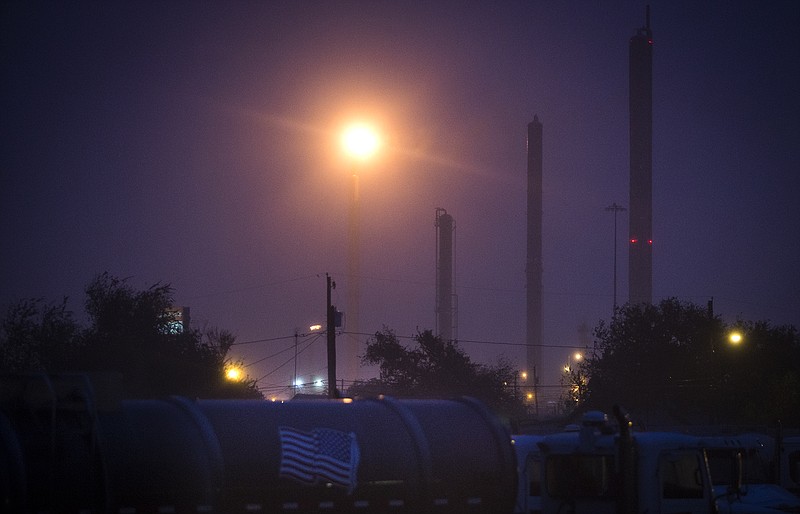Tropical storm Harvey has put a hurt on the Colonial Pipeline, a massive, 5,500-mile-long system that delivers some 2.6 million barrels of gasoline, diesel and jet fuel to 11 states from Houston to New York - including a spur pipeline that feeds Chattanooga, Nashville and Knoxville.
"That is important, because that's basically where Tennessee and all of the East Coast gets its gas from," said AAA Tennessee spokeswoman Stephanie Milani.
But because the storm landed west of refineries that feed the Volunteer State, Harvey shouldn't cause shortages here, Milani said - or even much of a price spike at the pump.
"There's no need for panic right now," she said. "We do not suspect there will be gasoline outages."
The average price per gallon in Tennessee was $2.13 a week ago, and on Tuesday, it was $2.17, Milani said.
Hurricane Harvey
- FEMA insurance chief: Harvey losses could top $11 billion
- Harvey's flooding blamed in major gasoline spill in Texas
- Harvey and Irma to slow U.S. economy but rebound should follow
- U.S. House to vote on $7.9 billion Harvey relief bill
- Immigrants are sought for labor shortage in Harvey recovery
- Shelter dogs displaced by Hurricane Harvey arrive in Chattanooga [photos]
- Mnuchin: Congress must tie Harvey aid to raising debt limit
- Harvey's floodwaters mix a foul brew of sewage, chemicals
- Houston's homeless shrug off riding out Harvey on streets
- As Harvey finally fizzles, a look at what made it so nasty
- 3 tornadoes in Tennessee blamed on Harvey
- Upbeat Trump pitches in at shelter for Harvey victims
- Trump asks for $7.9 billion down payment for Harvey relief
- As floodwaters recede, Houston officials look to recovery [photos, interactives]
- 'Don't touch me. I'm dying.' Harrowing Harvey stories emerge [photos, interactives]
- Local animal shelters open doors for furry flood victims from Texas, Louisiana
- Likely tornado damages homes as Harvey hits Deep South [photos, interactives]
- Gas prices rise after Harvey reduces flow from refineries, pipeline [photos, interactives]
- Forecasters predict sunny Labor Day after Harvey's remnants blow through
- Grim reality in the aftermath of Hurricane Harvey: More dead [photos, interactives]
- Harvey horror: Shivering girl, 3, clinging to her drowned mom
- Team made up of local emergency responders heads to Houston
- Texas chemical plant poised to explode amid Harvey flood
- Floodwaters drop across much of Houston; death toll at 20
- Western Louisiana in crosshairs as Harvey moves back to land [photos, interactives]
- Forecast brings hope as new shelters open, death toll rises [photos]
- Trump reassures those in Harvey's path that he will help [photos]
- Here are some ways to help victims of Hurricane Harvey
- Bracing for Harvey's return, worry renews: Is worst to come? [photos, interactives]
- Sohn: What lessons will we learn from Harvey?
- Chattanooga medical teams, volunteers aid Hurricane Harvey relief efforts
- More rain, more deaths: Harvey floods keeps Houston paralyzed
- Harvey slams region's economy, with damages in the billions
- Trump issues emergency declaration for Harvey in Louisiana
- Tennessee organization starts Harvey relief fund
- Desperate Harvey victims turn to social media to get rescued
- $3 billion disaster balance enough for immediate Harvey response
- A Houston family endured Harvey until the house was swamped
- Scientists say Harvey may be the soggy sign of future storms
- Residents in photo of flooded nursing home are 'doing fine'
- Photo of mother and baby's rescue becomes symbol of storm
- Public health dangers loom in Harvey-hit areas
- Officials act to protect downtown Houston from Harvey floods
- Harvey dilemma: Stay as water rises or risk flooded roads?
- Harvey spins deeper inland; full scope of damage is unknown
- Hurricane Harvey closes key oil, gas operations in Texas
- Houston roads start to flood as Harvey stalls
- Expert: Harvey weakened fast, but destruction just beginning
- Fearsome Hurricane Harvey slams into Texas Gulf Coast
- Menacing Harvey knocking on Texas coast as Category 4 storm
- Texas prepares as Harvey strengthens to Category 2 storm [interactive]
- Sandbags, plywood, generators: Texas coast braces for Harvey
"We originally were predicting anywhere from a 10 to 30 percent increase," she said. "We're thinking a more accurate price increase is going to be between 5 and 20 cents."
That's typical for a large tropical storm, she said.
"Even when you have the threat of a hurricane in the Gulf, prices go up," Milani said.
Colonial Pipeline Co. said Tropical Storm Harvey affected its Houston origin, which includes Pasadena, Houston, and Cedar Bayou. Service from those locations was interrupted during the storm and its aftermath, although the company is working to restore service and minimize the impact.
Colonial Pipeline's mainline has a capacity for 2.5 million barrels a day. Plantation Pipeline, which can carry 700,000 barrels a day from Baton Rouge, La., to Washington, D.C., and is owned by energy infrastructure industry giant Kinder Morgan. The two pipelines provide about 47 percent of the East Coast's supply, according to the U.S. Energy Information Administration (EIA). Tennessee gets about 300,000 barrels per day of transportation fuel from the two pipelines, the EIA says.
In Chattanooga, Kinder Morgan can store 220,000 barrels of petroleum product in 10 storage tanks at its fuel terminal at 4716 Bonny Oaks Drive., which is fed by both the Colonial and Plantation pipelines, its website says.
Pipelines are an efficient way to move fuel. Kinder Morgan says it costs about 3 cents to move a gallon of gasoline 1,000 miles via its Plantation Pipeline.
Contact staff writer Tim Omarzu at tomarzu@timesfreepress.com or www.facebook.com/MeetsFor Business or on Twitter @meetfor business or 423-757-6651.

